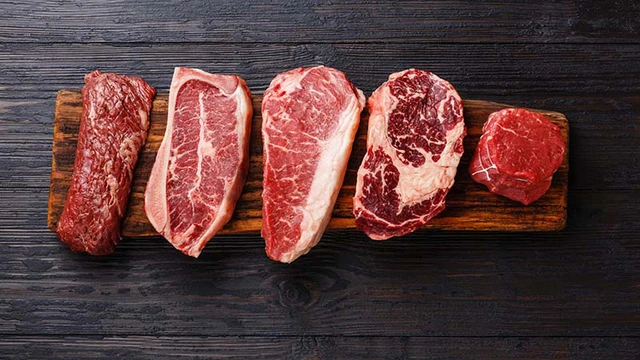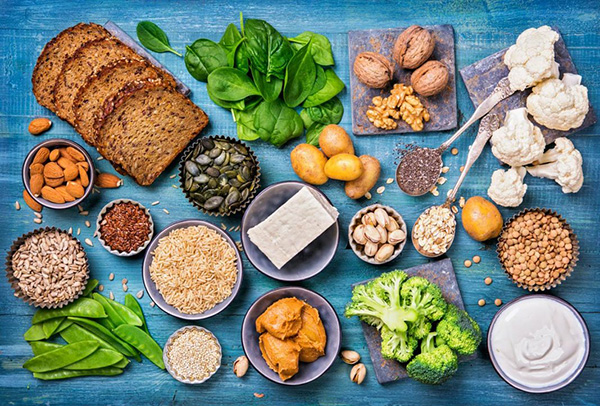Eating a lot of meat is not the best way to get protein. There are many other healthy protein-rich foods that are healthier and better for your heart.
1. The role of protein in cardiovascular health
Protein is one of the essential nutrients for the body, not only playing an important role in the formation of new cells and tissues, building and maintaining muscles, but also participating in many other important biological processes, including the activity of the cardiovascular system.
Protein helps maintain the elasticity of blood vessels, minimizing the risk of atherosclerosis. In particular, protein from plant sources helps reduce blood pressure by reducing the amount of bad cholesterol in the blood. Protein is also the raw material for building and regenerating heart muscle cells, helping to strengthen the heart.
According to the recommendation of the National Institute of Nutrition in 2016, the daily protein requirement for adults (19-30 years old) of working men is 74-68g; women is 63-60g. However, the exact amount for each individual depends on many factors such as protein absorption, lifestyle, metabolism, daily activity level…
When it comes to protein-rich foods, many people often think of meat. But in general, meat, especially red meat, often has more saturated fat than skinless poultry, fish and vegetable protein. Saturated fat can increase blood cholesterol and increase the risk of heart disease. Therefore, we should know how to choose healthy protein-rich foods that are good for cardiovascular health rather than just eating meat like red meat.

Red meats are not a healthy source of protein.
2. Healthy protein sources are good for the heart
The American Heart Association recommends that people choose healthy protein sources, mainly from plants; regularly eat fish and seafood… For those who eat meat or poultry, choose lean, unprocessed meat.
- Fish
Fish is one of the healthiest foods because it contains many important nutrients such as protein, vitamins and minerals, especially healthy omega-3 fats. Eating fish is easy to absorb, good for the digestive system. This is a superior advantage compared to proteins in animal meat.
Of the 3 types of omega-3 DHA, EPA and ALA, omega-3 DHA and EPA are the most beneficial for health. These two types are mainly found in fatty fish such as anchovies, herring, mackerel, cod, salmon, sardines, tuna… Research shows that omega-3 DHA and EPA can reduce triglycerides and slow the buildup of plaque inside the blood vessels. Omega-3s may also reduce inflammation in blood vessels, thus helping to protect against heart disease.
- Plant Protein
Plant protein is low in fat, low in cholesterol, and rich in vitamins, minerals, fiber, and antioxidants, and is considered an excellent source of nutrients for the heart, reducing the risk of stroke. Plant foods rich in protein include: vegetables, fruits, whole grains, beans, nuts, etc.
Provide fiber: Plant foods rich in fiber, mainly including vegetables, fruits, and whole grains, can reduce total cholesterol and bad cholesterol levels, both of which are important in promoting blood flow through the arteries by reducing the buildup of fatty plaque.
Fruits and vegetables contain many components that help lower cholesterol, including fiber, plant compounds sterols, and stanols. Eating a lot of fiber can also help lower blood pressure, prevent hypertension, and reduce stress on the heart muscle. Soluble fiber, such as fiber found in oats and fruits, helps reduce blood cholesterol levels.
High blood cholesterol levels, especially bad cholesterol, accelerate the process of atherosclerosis. Plaques build up in the artery walls, making them narrower, blood flow is difficult, and there is a high risk of heart attack and stroke.

Food sources rich in vegetable protein.
Providing omega-3 ALA: Omega-3 ALA is mainly found in plant foods such as walnuts, chia seeds, flax seeds, peas, spinach, etc.
Providing antioxidants: Fruits and vegetables are rich in plant compounds, commonly Polyphenols, an antioxidant that helps protect the body and neutralize free radicals.
Free radicals are highly reactive oxygen molecules that are produced by normal cellular processes and external factors such as radiation, air pollution, smoking, and exposure to chemicals. Without antioxidants to neutralize free radicals, cells will be damaged, increasing the risk of chronic diseases such as heart disease, diabetes, and cancer.





